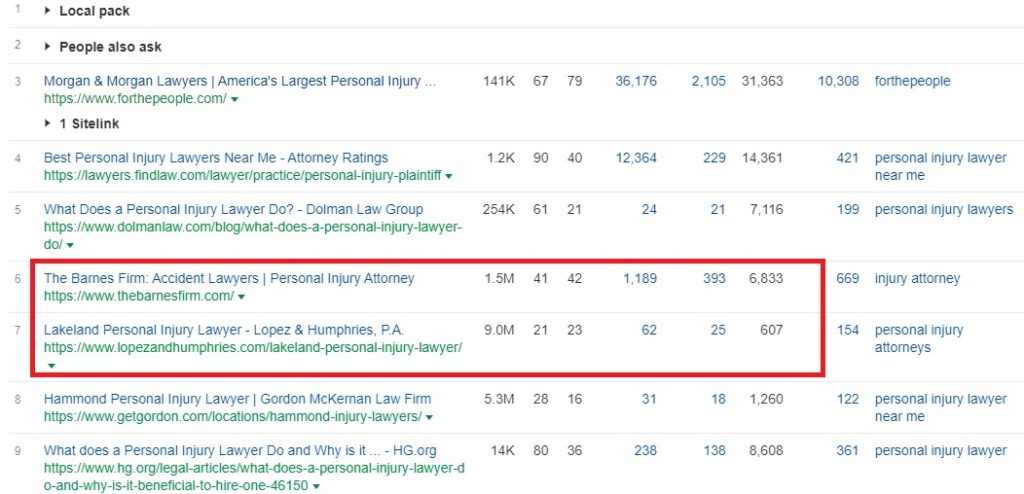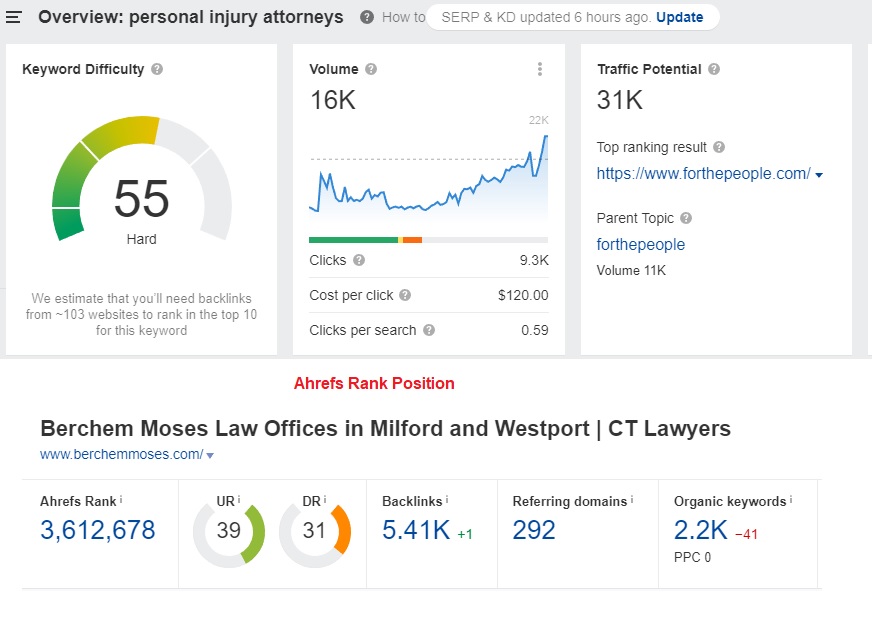What Are The Key Components of a Keyword Strategy?
- Keyword research: This involves identifying the keywords and phrases that are most relevant to your business or topic. There are several tools available to help with keyword research, including Google Keyword Planner and SEMrush.
- Keyword selection: Once you have a list of potential keywords, you need to select the ones that are most relevant and likely to drive traffic to your content. Consider factors like search volume, competition, and relevance to your target audience.
- Keyword optimization: This involves incorporating your selected keywords into your website content, including headings, subheadings, and body copy. However, it’s important to avoid keyword stuffing, which can actually hurt your search engine rankings.
- Monitoring and adjusting: After implementing your keyword strategy, you should monitor your search engine rankings and website traffic to see which keywords are performing well and which may need to be adjusted or replaced.
- Competitive analysis: It’s also important to keep an eye on your competitors’ keyword strategies and adjust your own accordingly to stay competitive in search engine rankings.
The Ultimate Guide: What Are the Key Components of a Keyword Strategy and Why They’re Essential for SEO Success
A keyword strategy is a plan of action for selecting and using specific keywords and phrases that are relevant to your business, product, or service to attract organic traffic from search engines.
It involves identifying the most effective keywords for your target audience and then optimizing your content to rank higher in search engine results pages (SERPs) for those keywords.
A keyword strategy is important because it helps businesses reach their target audience and drive more qualified traffic to their website or other online content.
By choosing the right keywords and using them strategically in your content, you can improve your website’s visibility and increase your chances of ranking higher in search engine results pages, which can ultimately lead to increased website traffic, higher conversion rates, and greater business success.
A brief overview of the components of a keyword strategy

A keyword strategy typically consists of several key components, including:
Keyword research: This involves identifying the most relevant and effective keywords for your business or topic.
Keyword selection: Once you have a list of potential keywords, you need to select the ones that are most relevant and likely to drive traffic to your content.
Keyword optimization: This involves incorporating your selected keywords into your website content, including headings, subheadings, and body copy.
Monitoring and adjusting: After implementing your keyword strategy, you should monitor your search engine rankings and website traffic to see which keywords are performing well and which may need to be adjusted or replaced.
Competitive analysis: It’s also important to keep an eye on your competitors’ keyword strategies and adjust your own accordingly to stay competitive in search engine rankings.
These components are all important for developing a successful keyword strategy that can help drive traffic to your website and improve your search engine rankings.
Keyword research is where we start

What is keyword research and why is it important?
Keyword research is one of the key components of a keyword strategy. It is the process of identifying and selecting the most effective keywords and phrases that will help drive traffic to your website or other online content.
Keyword research is an essential part of any successful search engine optimization (SEO) strategy, as it helps you to understand the search terms and phrases that people use when they are looking for products, services, or information related to your business.
There are several tools available to help with keyword research, including Google Keyword Planner, SEMrush, and Moz Keyword Explorer.
These tools allow you to identify the search terms that are most relevant to your business or topic, as well as the search volume, competition, and other factors that can impact your keyword selection.
Once you have identified potential keywords, it’s important to evaluate them based on their relevance to your target audience and their potential to drive traffic to your website. This involves considering factors like search volume, competition, and relevance to your target audience.
By selecting the most effective keywords, you can improve your website’s visibility and increase your chances of ranking higher in search engine results pages (SERPs).
Overall, keyword research is a critical component of a successful keyword strategy. By conducting thorough keyword research and selecting the most effective keywords, you can attract more qualified traffic to your website and improve your search engine rankings, leading to greater business success.
Tools for keyword research (Google Keyword Planner, SEMrush, etc.)
How to identify relevant and effective keywords for your content

Selecting the most relevant and effective keywords is a critical part of a successful keyword strategy. Here are some steps you can take to choose the right keywords for your business:
- Identify your target audience: Start by considering the audience you are trying to reach with your content. What are their interests, needs, and pain points? What search terms or phrases might they use when looking for information related to your business or topic?
- Use keyword research tools: There are several keyword research tools available, including Google Keyword Planner, SEMrush, and Moz Keyword Explorer. These tools can help you identify potential keywords and evaluate their search volume, competition, and relevance to your target audience.
- Evaluate keyword relevance: When selecting keywords, it’s important to consider their relevance to your target audience and the intent behind the search. Are the keywords you are considering likely to attract qualified traffic to your website? Do they align with the products, services, or information you are offering?
- Consider search volume and competition: While it’s important to choose relevant keywords, you also want to select terms that have a reasonable search volume and aren’t too competitive. Highly competitive keywords may be difficult to rank for, while low search volume terms may not drive enough traffic to your site. Aim for a balance between relevance, search volume, and competition.
- Test and refine: Once you’ve selected a list of potential keywords, it’s important to test them and refine your list based on their performance. Use analytics tools to monitor your website traffic and search engine rankings, and adjust your keyword strategy as needed to improve your results.
By following these steps, you can select the most relevant and effective keywords for your business, and optimize your content to drive more qualified traffic to your website.
Factors to consider when selecting keywords (search volume, competition, relevance to the target audience, etc.)
When selecting keywords for your content, it’s important to consider several factors that can impact their effectiveness in attracting traffic and improving your search engine rankings. Here are some key factors to consider:
Search volume: The search volume of a keyword refers to the number of people who search for that term on search engines like Google or Bing. Choosing keywords with high search volume can help you attract more traffic to your website. However, it’s important to strike a balance between search volume and competition (see below).
Competition: The level of competition for a keyword refers to the number of other websites that are trying to rank for that term. Highly competitive keywords can be difficult to rank for, while low-competition keywords may not drive enough traffic to your site. It’s important to choose keywords that have a reasonable level of competition and that you have a good chance of ranking for.
Relevance to the target audience: The keywords you choose should be relevant to your target audience and the products or services you offer. Consider the intent behind the search and whether the keywords are likely to attract qualified traffic to your site.
Long-tail vs. short-tail keywords: Short-tail keywords are broad, one or two-word phrases, while long-tail keywords are more specific, three or more words phrases. Long-tail keywords are often less competitive but may have lower search volume. Short-tail keywords may have a higher search volume but are more competitive. Consider using a mix of both long-tail and short-tail keywords.
Trends and seasonality: Consider any trends or seasonality that may impact the popularity of certain keywords. For example, keywords related to holiday shopping may have a higher search volume in the months leading up to the holidays.
Keyword optimization
Incorporating keywords into your content is a critical component of a successful keyword strategy. To do it effectively, use your target keywords in headings and subheadings, the first paragraph, and naturally throughout your content.
However, avoid “keyword stuffing,” or overusing your target keywords, as this can actually harm your search engine rankings. Additionally, using related keywords and phrases, including target keywords in image alt tags and URLs, can help improve your visibility for related searches and image searches.
By effectively incorporating your target keywords into your content, you can improve your search engine rankings, attract more qualified traffic to your website, and achieve your business goals.
Best practices for keyword optimization (avoiding keyword stuffing, using keywords in headings and subheadings, etc.)
Keyword optimization is essential to improve your search engine rankings, as search engines use keywords to understand the content of your website and match it with relevant search queries.
By incorporating your target keywords into your content in a natural and effective way, you can signal to search engines that your content is relevant to a particular keyword or topic, and improve your chances of ranking higher in search engine results pages (SERPs).
However, it’s important to avoid “keyword stuffing,” as this can actually harm your search engine rankings and make your content feel spammy.
By optimizing your content with the right keywords, you can improve your visibility in search engine results pages, attract more qualified traffic to your website, and achieve your business goals.
Monitoring and adjusting for higher ranking
Monitoring your search engine rankings and website traffic is essential to a successful keyword strategy. By keeping track of your rankings and traffic, you can identify which keywords are performing well and which may need to be adjusted or replaced.
This can help you refine your keyword strategy over time and improve your visibility in search engine results pages (SERPs), leading to more traffic, leads, and sales.
Additionally, monitoring your traffic can help you identify patterns and trends in user behavior, and adjust your content and marketing strategy accordingly. By regularly tracking your search engine rankings and website traffic, you can optimize your content for maximum performance and achieve your business goals.
How to monitor your keyword performance
Monitoring your keyword performance is critical to refining and improving your keyword strategy over time. Here are some ways to monitor your keyword performance:
- Use analytics tools: Google Analytics and other analytics tools can provide insights into your website traffic and search engine rankings. Use these tools to monitor traffic and identify which keywords are driving the most traffic to your site.
- Use keyword rank tracking tools: Tools like SEMrush and Ahrefs allow you to track your search engine rankings for specific keywords over time. This can help you identify trends and adjust your keyword strategy accordingly.
- Analyze user behavior: Analyzing user behavior, such as click-through rates and time on the page, can help you identify which keywords are most effective at driving engagement and conversions.
- Monitor your competitors: Keeping an eye on your competitors’ keyword strategy can help you identify gaps in your own strategy and adjust your keyword selection accordingly.
By regularly monitoring your keyword performance, you can refine your keyword strategy over time and improve your visibility in search engine results pages (SERPs). This can lead to more traffic, higher engagement, and greater business success.
Competitive analysis
Analyzing your competitors’ keyword strategies is an important part of refining and improving your own keyword strategy. To analyze your competitors, start by identifying the top competitors in your industry or niche.
Then, use keyword research tools to identify the keywords that they are targeting and analyze their content to see how they are using their target keywords. Use analytics tools to track their search engine rankings and website traffic and identify gaps and opportunities to differentiate yourself from your competitors.
By analyzing your competitors’ keyword strategies, you can refine your own strategy, stay competitive in your industry or niche, and attract more qualified traffic to your website.
Adjusting your keyword strategy
Adjusting your keyword strategy is critical to staying competitive in search engine rankings and driving traffic to your website. Here are some reasons why it’s important to adjust your keyword strategy:
- Changes in search engine algorithms: Search engine algorithms are constantly changing, and what worked well in the past may not be as effective today. By adjusting your keyword strategy in response to algorithm changes, you can maintain your search engine rankings and visibility.
- Changes in user behavior: As user behavior changes, the keywords that they use to search for information also change. By adjusting your keyword strategy to reflect these changes, you can attract more qualified traffic to your website.
- Emerging trends and topics: New trends and topics can create new opportunities for your business. By adjusting your keyword strategy to incorporate emerging trends and topics, you can attract more traffic and stay ahead of the competition.
- Competition: Your competitors are also adjusting their keyword strategies to stay competitive. By keeping an eye on their strategies and adjusting your own accordingly, you can maintain your position in search engine rankings and attract more traffic to your website.
- Measuring success: By regularly monitoring your search engine rankings and website traffic, you can identify which keywords are performing well and which may need to be adjusted or replaced. This can help you refine your keyword strategy over time and improve your business outcomes.
Overall, adjusting your keyword strategy is critical to maintaining your search engine rankings, attracting more qualified traffic to your website, and staying ahead of the competition.
By staying up-to-date with changes in search engine algorithms, user behavior, and emerging trends, you can optimize your content and achieve your business goals.
Conclusion
In conclusion, a keyword strategy is a critical part of any successful online marketing effort. By conducting keyword research, selecting the most effective keywords, and using them in your content in a natural and effective way, you can improve your search engine rankings, attract more qualified traffic to your website, and achieve your business goals.
Monitoring your keyword performance, adjusting your strategy to stay competitive, and analyzing your competitors’ keyword strategies can help you refine your strategy over time and achieve even greater success. By taking the time to develop and execute a strong keyword strategy, you can differentiate yourself from your competitors, reach your target audience, and achieve your business objectives.
If I can help you in any way please reach out by visiting my website milfordctmarketing.com or calling 860-566-8987


